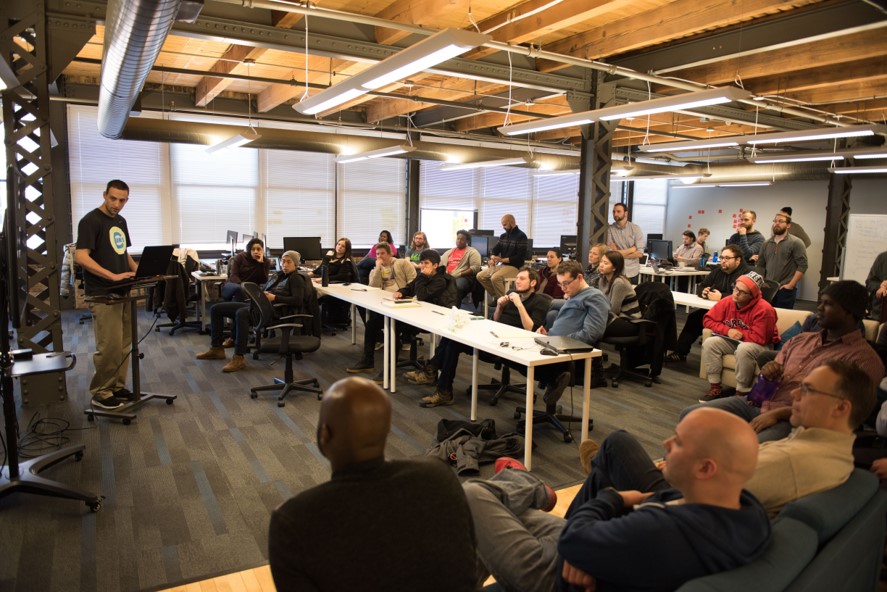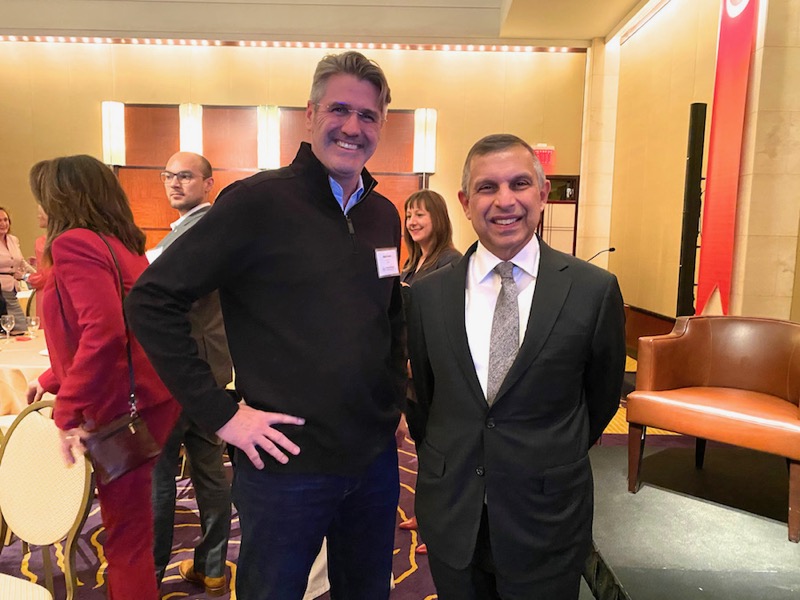Coding Dojo Blazes a Trail to 21st Century Careers

In an increasingly volatile workplace, more career paths are taking zigs and zags. Mark T. Smith is an artist, entrepreneur and business leader now serving as Vice President of Growth and Partnerships at Coding Dojo, a Seattle-based startup on a path to revolutionizing education and job training for the 21st Century. We caught up with Mark at Cafe Milano on a Saturday afternoon.
What is Coding Dojo?
Coding Dojo is a technology-enabled education company. We teach people how to code, which is highly in demand as you can imagine. It’s very, very transformative for people’s lives. You see people go from low-skill, low-wage jobs to high-skill, high-wage jobs. And sometimes they triple their income. Every day that happens. It’s inspirational.
Who are the instructors?
Here's a bio of one of our Arlington instructors: From being a NASA Langley developer to lead instructor, Dan Oostra's expertise is truly out of this world. During his career, he's developed data visualization tools, software for weather balloons, and has worked to provide and curate NASA data for millions of users. In his spare time, Dan loves to make ridiculously spicy beef jerky, learn new street magic tricks (be sure to ask him!), fly drones, and travel.
I want to meet that guy! What does the program cost?
It depends on where in the country you are – we have 11 locations – but the average is about $13,000.

And that sets you up for what?
The easiest way to say it is you go from the 20th-Century economy to the 21st-Century economy in your skills. So some people become programmers, some people are entrepreneurs who start their own business, other people become project managers or they’re in a job related to tech. If English was the language of business for the 20th Century and centuries prior to that, programming is the language of business for the 21st Century. So it’s really just giving people fluency in a language that will be the currency in the future, basically.
Can you do it all online?
You can. You can learn it online or you can come to a location. People who are working and doing this tend to do it online. And people who are just going to make the full immersion into it and make the transformation do it on site, generally speaking.
I’m starting a new business called “From Fired to Fabulous.”
Oh my god I love that name!
Thank you. Well, I’ve been fired a lot. I’ve been fired more than anyone I know, and I’ve also been hired a lot, and I’ve been a headhunter, so I’ve seen a lot of transitions in the workplace, and I want to help people through them. One of the things I’ve been telling people who are in those transitions – and it does tend to happen to people in their 50s – I see it a lot…
No doubt. You’re preaching to the choir on that.
…So what I’ve been telling them is, “Think about working for the next 10 or 15 years – because many people are – what do you want

to be doing?” And it’s really worth investing in yourself with a new set of skills. If you’re thinking about the next 10 or 15 years, to me $13,000 is a completely reasonable amount of money that you will make back very quickly in the kinds of jobs you’re talking about in tech.
Yes. There are a bunch of different groups that we get. We get career changers – they’ve got 20th Century skillsets and they want to have 21st-Century skills. There are people in their 50s who are thinking that retirement isn’t going to be at 65, it’s going to be at 75, 80 maybe -- especially if they have children. So they’re thinking, what can I do to to reskill to keep myself relevant to increase my salary and extend the longevity of my career? Learning coding is a really powerful way to do that because, you don’t necessarily have to be a programmer at the end, but having fluency in the languages allows you to take the skills you do have which are probably numerous, and build on those skills.
How would you use it to re-skill?
In my case you would take creativity and entrepreneurialism, add a layer of understanding how technology is being used and then just stack them all together and go to the next thing. So I would never become like a programmer – that’s not my passion in life – but understanding what that means in terms of economics and how the world works now – it fundamentally changes my employability. I can now get jobs in a broad set of economic sectors that I couldn’t before.
Your graduates have gone on to jobs at Google, Apple and Amazon, but what's the typical case study of someone who takes the course, especially career changers?
We get so many different kinds of people. We had a single mom, recently separated, who had four young children all under the age of eight, and was a school teacher, and made the commitment to come to Coding Dojo. She talked with her mom, got her kids set up with her mom, and came in and just went at it for three and half months, and at the end of that she went from a school teacher’s salary to a salary as a web developer. I think her salary is $112,000 a year. So not not only did it transform her life it transformed her children’s lives. She was out of Seattle.
Then we had another case in Boise. Boise has a lot of resettled asylum seekers. The area has a history of bringing people into that community. We had a student from Burundi. He had never typed, let alone operated a computer. He graduated and had two job offers from local companies and went on to be hired at just under six figures. It was transformative for him and his family, but also, he has like six brothers that are still in Burundi that he’s supporting and creating opportunities for.
We had a guy whose company was sold when he was 60 and he didn’t want to retire. He just wasn’t ready. I think financially he probably could have but just felt he had some more useful things to give in life. So he came back and reskilled and went on to a whole other career. So we have 18-year-olds, 60-year-olds, immigrants – diversity is part and parcel of what we do because the barrier to entry is really low financially.

Can people borrow money to do it?
Absolutely. We work with a funding partner. They’re called SKILLSfund. I have to say – I just came from a conference in Austin that they hosted – I told them when I saw them that I’ve been at Coding Dojo for a year and a half and not one person has complained about them. That to me says everything about them. You would think there would be one complaint or someone unhappy. But it’s very well constructed. They’re very thoughtful about the way they do their loans. You can self-fund, you can put it on a credit card, you can go to a bank and get a loan. When you thnk about it, it costs the same as a used car. Like a Honda. It’s not terribly expensive.
Think of the investment in your career and your future. You would probably make it back in the first few months of working.
You do. I can’t think of any other educational opportunity where you can spend thirteen grand, and get a six-figure job. It’s just unheard of.
One thing that’s going on is the increasing portability of jobs, the increasing number of jobs that are remote. And that this is going to become a more common model in the economy. Is that part of what you’re preparing people for?
Totally. For instance, we’re in Tulsa, Oklahoma. What Tulsa has decided as a community is that they want to be the remote hub for tech. So they have a program there they call “Tulsa Remote” and they’re inviting remote workers to move to Tulsa for the quality of life. If you have a family, Tulsa is a great place to live. Even if you’re single it’s a great place to live. There’s lots to do. It’s kind of happening. I was just there. It’s a cool little city. When you make developer money in Tulsa, Oklahoma, it goes a long way. Your standard of living is great because cost of living is low. So we’re absolutely preparing companies and cities and individuals for that reality. I think given the congestion in Washington, D.C., it’s logical to be moving to more remote workplaces. And most American cities are facing that.
How do people know if they have the aptitude for this?
That’s a great question. We say we can teach anyone to code, and we mean it. We work with individuals to get them through the program. If you have the will to do this thing, you’ll succeed. But it takes a commitment of time, of money. We see some people – who think they’re not going to make it – but then they have a breakthrough, and then they have their next breakthrough, but it’s hard. It’s not easy.
But it’s not easy to get a master’s degree either. And it’s a lot more expensive.
True.
I feel bad seeing all these young people now who are taking on mountains of debt and I think we’re only beginning to see what effects that has on the economy. I was speaking on a panel yesterday at GWU – a career fair including students from NYU and Penn. And their was a gal on the panel from the State Department, I think she was about 40. And she said, “Well student debt – that’s just something I’m going to have to live with.” And I thought to myself, that’s awful. So $13,000 in your case gets you something that’s probably much more useful than a lot of master’s degrees out there that cost ten times as much.

I’m a beneficiary of an awesome liberal arts education. So I’m not down on the liberal arts, and there’s lots of studies that say it will prepare you for the future that’s coming, because it gives you a lot of flexibility…
…And I’m not talking about a liberal arts education there. It’s that extra graduate degree that doesn’t necessarily give a person tangible skills to get a job, it’s just sort of required these days. So what’s your response to that?
My thinking around that is that life is long. So there’s no rush to get that doctorate or that master’s degree. You can do it in your thirties, you can do it in your fourties. Most people are going to live to be 80. There’s lots of time to do that. So if you’re able to learn coding and get a job where you’re making six figures, you can fund your own education. And so if you have the aptitude and the desire to do that, it seems like a lot more logical scenario to me. Because then you’re not leveraged out under this mountain of debt. When you have all that debt you can’t buy a home, there are so many things you can’t do. There are so many things you can’t participate in.
Could this revolutionize education?
Students are starting to look at education differently. They’re saying, “Geez, I’m going to spend X and what am I going to get?” That wasn’t always the case. And you also see from a jobs perspective that there’s such a deficit of tech skills in the economy – it’s almost impossible for you not to get hired if you can code. And if you couple those skills with something else, then you’ve really got something. Because every job is a tech job. There’s no job that’s not a tech job anymore. So you’re going to need these skills no matter what. It’s the basic language you need to be operational.
Read more about Coding Dojo here.




